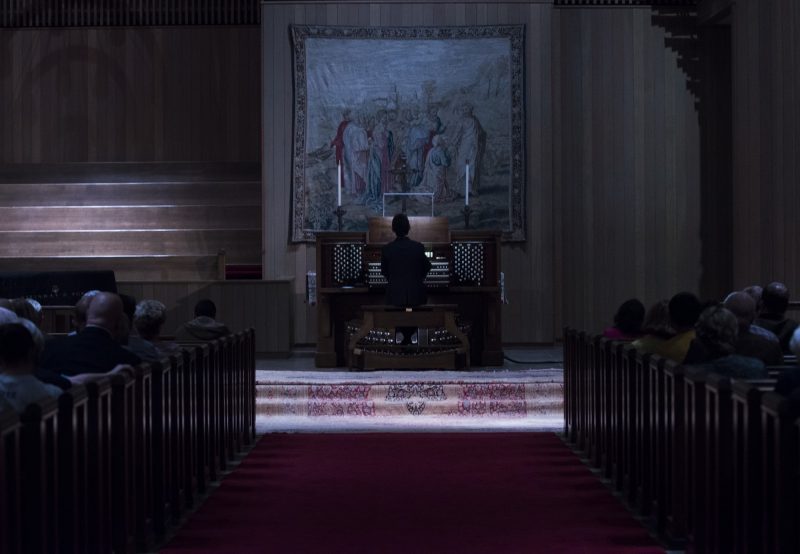In preparation for Halloween, some Trinity students spent a night learning about the misconceptions surrounding possession, demons and exorcism from Mark Clarke, pastor at St. Anthony High School in San Antonio. As about 40 students snacked on Halloween candy, Clarke spoke about his personal experiences with the possessed as a Catholic youth pastor and described how young people usually invite demonic spirits.
The Catholic Student Group (CSG) hosted Clarke for members and non-members alike to learn more about the Catholic teachings surrounding exorcism. Senior Luke Ayers, president of CSG, described the importance of the talk.
“The point is to dispel some false notions or ideas that aren’t really grounded in reality about exorcism and what demons actually are — not the Hollywood picture. I believe that Satan and demons are very real and are very evil. When people take those kinds of things lightly, it’s not good. I think to be able to take things like this seriously, we need to be fully informed and not have wildly false ideas and have all the information so we really can protect ourselves against their influence,” Ayers said.
Ayers and Maria Teresa Kamel, campus minister, worked together to get Clarke to come to Trinity. Kamel thought scheduling the talk around Halloween time would create the most interest and participation.
“I thought it was going to be an interesting thing because it’s Halloween, and it’s also in a lot of movies, so it’s an interesting topic, and I thought it’d be nice to have someone talk about it that actually knew about it. I don’t think you have to be Catholic to think that it’s interesting or spooky,” Kamel said.
Clarke started his talk with a prayer and described his background as a pastor directing campus ministry for the Archdiocese of San Antonio. Because of his role in the Catholic Church, Clarke oversaw ministry for CSG at Trinity from 2012 to 2015. Clarke discussed why he agreed to give the talk.
“Given the fact that Halloween is so close, and November is the month that we honor the dead, it’s a timely topic that I think people have a lot of misconceptions about like demons and cults and that kind of thing. I always like to have the opportunity to tell people the church’s understanding of angels and demons and cults and exorcisms,” Clarke said.
The first topic Clarke covered was how he knows if a person is feeling a demonic spirit in their life. Clarke asks the person three questions: Have you gone to confession recently? Do you have issues with drugs and alcohol? Have you ever engaged in any kind of cult activity? Between each question, he gave an example of someone he had met that had answered yes. He then described how he expelled the demonic influence from that person through prayer and blessings.
“The first thing is always, ‘When was the last time you went to confession?’ Being in a state of grace is incompatible with evil and darkness, so we always begin there. The second thing is issues with drugs and alcohol. They impair your judgment, they make you more vulnerable, you can put yourself in situations that had you been sober you might not have. They diminish your senses and you become more vulnerable [to demonic spirits],” Clarke said.
Clarke also described mainstream forms of cult activity.
“The last one is that invitation, particularly with being in a cult. That could even be like Ouija boards, now they’re so common they’re like toys. Or horoscopes, not just reading for a joke but if you plan your day around that or you go to someone who claims to have that knowledge. If you expose yourself to that or if you don’t trust God who knows all things and knows what’s best for you. If you move away from that and you try to seek power or knowledge apart from God then that in itself is not good,” Clarke said.
Clarke went on to talk about misconceptions surrounding ghosts and haunted houses, leading up to his knowledge about exorcism. Clarke is not personally an exorcist, but he knows priests who are and he trained briefly in exorcist ministry. The criteria for knowing if someone is possessed by a demon is if the person can speak or understand a language previously unknown to that person, if the person has cult knowledge, if the person has an aversion to sacred objects or if the person can do supernatural physical things. Clarke described the dangers surrounding exorcism.
“Exorcism is a religious ritual, so you don’t do it at home. You have to do it in the church because it’s like baptism — it’s a ritual. The only reason you would do it at home would be to protect the identity of the individual. This work is dangerous. You’re messing around with demons and you have to call it forth. You have to name it and it gets violent, people will fight because it has an aversion to the sacred. It doesn’t want to leave,” Clarke said.
Sophomore Polo Perez attended the talk with other members of Omega Phi Fraternity as an event the fraternity required for Greek life standards. Perez described how the talk built on knowledge he had learned from high school.
“I went to Catholic school for high school and I had learned a little bit about exorcism and stuff like that because one of our priests was an exorcist in the past. Overall, I learned a lot more about exorcism than I did before,” Perez said.
Clarke hopes that people learned more about the Catholic teachings from his talk.
“I always emphasize that God wins. I think it’s important to know that that stuff is dangerous and a lot of people might think it’s harmless, but the reality is that it can have consequences,” Clarke said.













